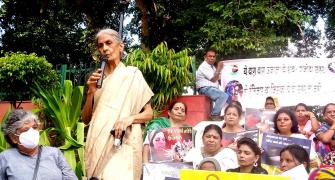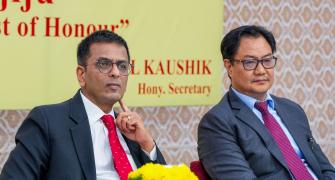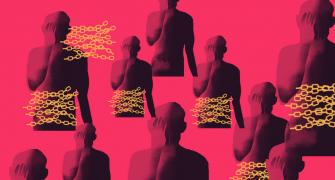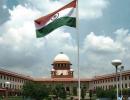'What did these men mean to the government? What does its support for these men say about this government?'

Among the first to challenge the remission of the 11 men convicted of raping Bilkis Bano and killing 14 members of her family, including her 3-year-old daughter, were three women: Subhashini Ali, Roop Rekha Verma and Revati Laul.
Jyoti Punwani spoke to them after the remission was struck down by the Supreme Court on Monday.
Subhashini Ali, vice-president of the All India Democratic Women's Association (AIDWA), and CPI-M politburo member, has been a familiar face in women's struggles over the last many decades. The former Lok Sabha MP from Kanpur, where she has waged many a fight for workers, was the first petitioner in the joint PIL.
Did you expect this verdict?
We thought it would be difficult for any court with any decency to uphold this remission. But the way Supreme Court judgments have been going these days, we couldn't be sure.
Justice (K M) Joseph and (B V) Nagarathna made very pertinent comments in court during the hearing, and after Justice Joseph retired, Justice Nagarathna kept that up.
Her judgment has brought out all the wrongdoings of the government; made the right to liberty conditional on the accused's acts of omission and commission, and ended by ordering that they be sent back to jail. One couldn't have hoped for anything better.
Why did you file the petition? Do you know Bilkis Bano?
Of course I know her. AIDWA was the first to meet her. I met her in the Godhra refugee camp on the day after she was brought there early in March 2002. She was skinny and heavily pregnant.
I met her again much later in Lucknow, after her rapists were convicted.
We went to court because there was nothing else one could do. This was such a brazen misuse of power.
I remember reading Bilkis Bano's interview after the remission in which she said: 'Is this the end of justice?' After that, one couldn't just be standing around doing nothing.
Who were your lawyers?
Kapil Sibal started it. Then there was Aparna Bhat, Nizam Pasha, Vrinda Grover, Indu (Indira) Jaising, and, of course, Bilkis's lawyer Shubha Gupta.
There was a point when Justice Joseph said the government was waiting for him to retire... (external link)
Did you lose hope then?
We didn't know when it would end. The kind of things the government was doing in court: Saying a warrant hadn't been served on someone; someone else couldn't be found; no translation available... It was shocking that the Supreme Court was asking for documents and the government was saying we don't know if we should give them to you.
Many see this judgment as encouraging for women.
I want to know, how is it encouraging?
On August 15, Independence Day, people convicted after 8 years of battle in various courts are let off and treated like heroes. Then it takes one-and-a-half years to get them to be sent back to jail -- in fact, they haven't yet gone back.
How many women can think of accessing justice in this situation? We had a battery of the best lawyers. Who has access to such lawyers?
Cases of rape and sexual violence are anyway very difficult to fight. But this case shows that if I'm just an ordinary woman who has to fight those connected to the ruling party, then everybody will be against me, the government, the bureaucracy, the police... all of them will be on the side of the perpetrators.
Bilkis Bano's case was the only strong case in the 2002 Gujarat cases to get a conviction. Her clothes were kept carefully; her statement was taken. What happened to her was so horrendous that it's still remembered by everyone.
Then, her husband was very supportive, as was the group that fought for her. And she herself was very brave. So was her lawyer.
But all these factors cannot be there for every single victim.
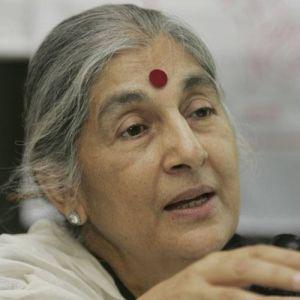 IMAGE: Subhasini Ali Photograph: Kind courtesy Subhasini Ali/Facebook
IMAGE: Subhasini Ali Photograph: Kind courtesy Subhasini Ali/FacebookHow did the three of you come together for this petition?
I was in Delhi; I was the first to sign it. The other two were contacted by lawyers. I told the lawyers these were women who were not going to say no (to being co-petitioners).
The judgment in a way indicts the most powerful persons in the country. Are you afraid of the repercussions?
This is the first knock that this government has got from the court in the last many years. Article 370, CAA -- nothing happened. On electoral bonds we are still waiting. So yes, we don't know what the repercussions will be.
But seeing the way this case was fought -- such an army of lawyers used to come for the Government of India and the government of Gujarat, all advocate generals and top notch lawyers of the Supreme Court, bringing all those files... it was all so intimidating.
Seeing all this, the biggest question I want to ask, and I want the people to ask is: Why did the government go out on a limb for these 11 men convicted of rape and mass murder? What did these men mean to the government? What does its support for these men say about this government?
Feature Presentation: Aslam Hunani/Rediff.com

